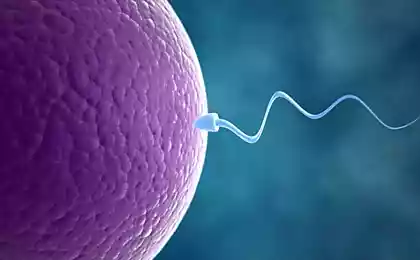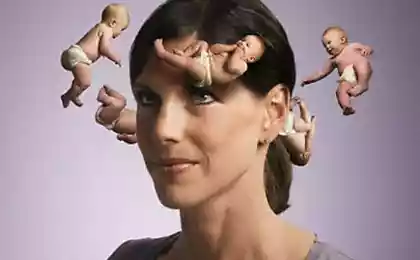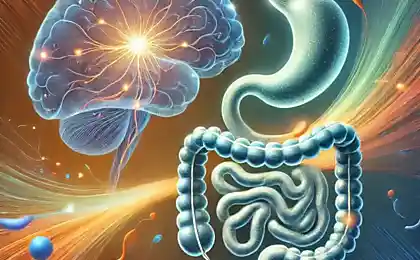444
Psychosomatics of infertility
Many people believe that the phrase "All diseases of the nerves" — just a funny pun. But in fact it is the essence of this direction in medicine and psychology, psychosomatics (from Greek 'psyche' — the soul, "soma" — body). Psychosomatics suggests that many (if not all) illnesses have psychological underpinnings.
Today in the article about what not aware of the psychological reasons may be the woman who can't get pregnant, let's talk about psychosomatics of infertility.
Twenty five million five hundred forty four thousand nine hundred forty nine
So that it may be for reasons:
1) Fear of pregnancy, childbirth, death.
Once, perhaps, in childhood, the little girl heard from my mother or grandmother, how hard it was the pregnancy which had complications, how painful was the birth. This so frightened the child that she set a prohibition "Not to give birth!".
2) Fear of birth of the patient, of a dead child, a child with disabilities, the fear of miscarriage.
As in the previous paragraph, once the girl learned about the birth of a sick child or child with congenital abnormalities and it is so impressed that she decided to avoid such a fate by infertility.
3) Reluctance to have a child from THIS man.
When a woman married not for love, but because "it's time" or because the man is good on the conscious level she is generally happy with her husband, but unconsciously not to see him as a potential father for her child. Or the scandals in the family, the tense situation in the house, the lack of feeling of safety next to her husband.
4) Fear of not be held, as a mother, fear of responsibility.
The child is a big responsibility, it needs proper care he needs care and love. If a woman feels inwardly that she is not ready, she's afraid to take responsibility for the life of the little man, it can be a barrier to pregnancy.
5) Financial instability.
Not only financial, but also the instability of the General political atmosphere in the country, the crisis, the constant moving can cause the unwillingness to have a child in unfavorable external conditions, poor living conditions.
6) Rejection of their feminine nature.
If the parents wanted a boy but had a girl, she was raised as the son (dad went fishing and repairing cars in the garage was blamed for the tears) in the future a girl may unconsciously treat her pregnancy as a "recognition" that it is, nevertheless, against his parents ' wishes, a girl. Or when she married plays the role of "head of household": her main income, she runs, she plays the role of the man-the breadwinner — role reversal in the family.
7) the Fear of helplessness.
The fear of women that after delivery she will become dependent on their men, will not be able to some time to work, the fear of being abandoned in such a helpless position.
8) Fear of spoiling my body shape.
So, the girl's attractive appearance, accustomed to the attention, may be afraid to spoil your figure during and after pregnancy, stretch marks, fear to gain weight, spoil the shape of the breast.
9) Psychological trauma.
Often the girl does not want to bear a child because his childhood was so awful, it was so much pain that she doesn't want her baby to do the same. The perception of childhood as a period of helplessness, powerlessness, pain and suffering and wants to protect a potential little one to have not experienced the kind. Or lack of after a childhood of mental and spiritual forces on education, on care of the child, to show tenderness, sensitivity, the desire to endure the vagaries of the baby.
10) Negative suggestion and auto-suggestion.
The girl could hear that pregnant women are selfish or thick toddler, or hysterical, or unstable. Or could independently come to the negative associations connected with pregnancy (for example, after allegations that a pregnant woman swallowed a watermelon). Pregnancy itself is associated with something unpleasant, rude, not right, not natural.
11) Shame, guilt.
Probably, the sexual act itself is perceived as something shameful as a sin, attitudes to sex as something obscene. When the parents of a child went overboard with the "sex education", preventing sexual initiation of girls "God forbid, the hem will bring, suddenly pregnant.". Pregnancy associated with guilt in violation of the previous prohibitions.
12) self-punishment.
When a desired pregnancy does not occur due to the fact that the woman is unconsciously punishing yourself for any perceived faults, atoning for anything done.
13) Resentment at his mother.
When the word "mother" is associated with obidi, tyranny, control. The feeling of hatred, hostility, condemnation own mother causes reluctance to engage in this role, accompanied by a blockade of pregnancy.
14). Secondary benefits of a childless lifestyle.
The reluctance to change your way of life, their way of life, the unwillingness to change the routine to the needs of the child. The reluctance to adopt a new "settled" life, to part with freedom, independence, autonomy.
Point hand massage to reduce appetite and not only
33 product that will cause cancer to starve
It is important to note that psychological causes of women's (and men too) of infertility are often not perceived, lying in the unconscious, so to identify the real cause of infertility will help only a specialist psychologist.
Yourself you can start investigating their beliefs regarding pregnancy, imagine how your life will change with this baby. And what do you like about your current lifestyle, what will be gone after the baby is born? Explore your fears and concerns.
P. S. And remember, only by changing their consumption — together we change the world! ©
Source: lifehealingspace.com/psihosomatika-besplodiya/
Today in the article about what not aware of the psychological reasons may be the woman who can't get pregnant, let's talk about psychosomatics of infertility.
Twenty five million five hundred forty four thousand nine hundred forty nine
So that it may be for reasons:
1) Fear of pregnancy, childbirth, death.
Once, perhaps, in childhood, the little girl heard from my mother or grandmother, how hard it was the pregnancy which had complications, how painful was the birth. This so frightened the child that she set a prohibition "Not to give birth!".
2) Fear of birth of the patient, of a dead child, a child with disabilities, the fear of miscarriage.
As in the previous paragraph, once the girl learned about the birth of a sick child or child with congenital abnormalities and it is so impressed that she decided to avoid such a fate by infertility.
3) Reluctance to have a child from THIS man.
When a woman married not for love, but because "it's time" or because the man is good on the conscious level she is generally happy with her husband, but unconsciously not to see him as a potential father for her child. Or the scandals in the family, the tense situation in the house, the lack of feeling of safety next to her husband.
4) Fear of not be held, as a mother, fear of responsibility.
The child is a big responsibility, it needs proper care he needs care and love. If a woman feels inwardly that she is not ready, she's afraid to take responsibility for the life of the little man, it can be a barrier to pregnancy.
5) Financial instability.
Not only financial, but also the instability of the General political atmosphere in the country, the crisis, the constant moving can cause the unwillingness to have a child in unfavorable external conditions, poor living conditions.
6) Rejection of their feminine nature.
If the parents wanted a boy but had a girl, she was raised as the son (dad went fishing and repairing cars in the garage was blamed for the tears) in the future a girl may unconsciously treat her pregnancy as a "recognition" that it is, nevertheless, against his parents ' wishes, a girl. Or when she married plays the role of "head of household": her main income, she runs, she plays the role of the man-the breadwinner — role reversal in the family.
7) the Fear of helplessness.
The fear of women that after delivery she will become dependent on their men, will not be able to some time to work, the fear of being abandoned in such a helpless position.
8) Fear of spoiling my body shape.
So, the girl's attractive appearance, accustomed to the attention, may be afraid to spoil your figure during and after pregnancy, stretch marks, fear to gain weight, spoil the shape of the breast.
9) Psychological trauma.
Often the girl does not want to bear a child because his childhood was so awful, it was so much pain that she doesn't want her baby to do the same. The perception of childhood as a period of helplessness, powerlessness, pain and suffering and wants to protect a potential little one to have not experienced the kind. Or lack of after a childhood of mental and spiritual forces on education, on care of the child, to show tenderness, sensitivity, the desire to endure the vagaries of the baby.
10) Negative suggestion and auto-suggestion.
The girl could hear that pregnant women are selfish or thick toddler, or hysterical, or unstable. Or could independently come to the negative associations connected with pregnancy (for example, after allegations that a pregnant woman swallowed a watermelon). Pregnancy itself is associated with something unpleasant, rude, not right, not natural.
11) Shame, guilt.
Probably, the sexual act itself is perceived as something shameful as a sin, attitudes to sex as something obscene. When the parents of a child went overboard with the "sex education", preventing sexual initiation of girls "God forbid, the hem will bring, suddenly pregnant.". Pregnancy associated with guilt in violation of the previous prohibitions.
12) self-punishment.
When a desired pregnancy does not occur due to the fact that the woman is unconsciously punishing yourself for any perceived faults, atoning for anything done.
13) Resentment at his mother.
When the word "mother" is associated with obidi, tyranny, control. The feeling of hatred, hostility, condemnation own mother causes reluctance to engage in this role, accompanied by a blockade of pregnancy.
14). Secondary benefits of a childless lifestyle.
The reluctance to change your way of life, their way of life, the unwillingness to change the routine to the needs of the child. The reluctance to adopt a new "settled" life, to part with freedom, independence, autonomy.
Point hand massage to reduce appetite and not only
33 product that will cause cancer to starve
It is important to note that psychological causes of women's (and men too) of infertility are often not perceived, lying in the unconscious, so to identify the real cause of infertility will help only a specialist psychologist.
Yourself you can start investigating their beliefs regarding pregnancy, imagine how your life will change with this baby. And what do you like about your current lifestyle, what will be gone after the baby is born? Explore your fears and concerns.
P. S. And remember, only by changing their consumption — together we change the world! ©
Source: lifehealingspace.com/psihosomatika-besplodiya/
Differently does not understand Why parents hit children
Bitter pill: The first experience of fighting sweaty hands is always too early.























